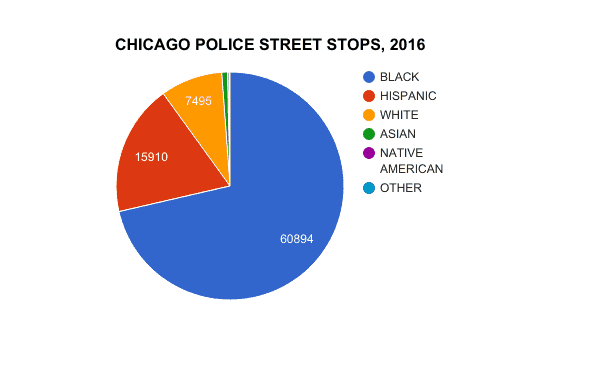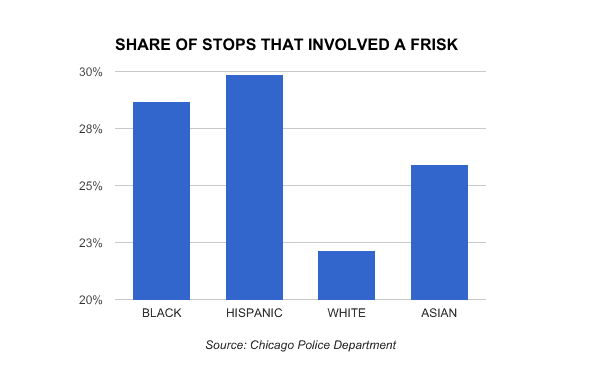Watchdogs: 71 Percent of Chicago Cops’ Street Stops Are of Blacks
Mick Dumke, Chicago Sun Times, February 11, 2017
The number of street stops by the Chicago Police Department has plummeted by 85 percent in a year, but African-Americans continued to account for the vast majority of those detained and frisked, a Chicago Sun-Times investigation has found.
{snip}
The police reported stopping thousands of people because they fit the description of a criminal suspect, were found near the scene of a crime, or acted in a manner deemed “indicative” of drug dealing.
In most cases, officers checked a box on their reports for “other” to explain the justification for the stop. The department hasn’t released records to show whether further details were provided.
“It’s kind of a double-edged sword,” says Ald. Roderick Sawyer (6th), chairman of the Chicago City Council’s Black Caucus. He says many of his South Side constituents would like the police to be more aggressive in searching for guns.
But Sawyer says he’s concerned the police continue to stop people without a “reasonable suspicion” of a crime, which is required for an investigatory stop to be constitutional.
{snip}
Police spokesman Anthony Guglielmi says the department tries to safeguard rights as it protects the public: “Good policing and civil rights are not mutually exclusive.”
Guglielmi notes that “most of CPD’s investigatory stops occurred in high-crime areas, primarily on the South and West Sides, precisely in the districts driving violence.”
{snip}


Data the police department culled from the stop forms through Dec. 4 of last year show:
• Police made 85,302 street stops through the first 11 months of 2016 — putting them on pace for 92,411 by year’s end. That’s 85 percent fewer than 2015, when they made more than 601,700 stops.
• The race of those stopped hasn’t changed. A 2015 analysis by the ACLU found that 72 percent of those stopped by police between May and August 2014 were black. According to the 2016 police data, 71 percent of those stopped were African-American, 19 percent were Hispanic, 9 percent white and 1 percent Asian.
• African-Americans and Hispanics were more likely to be frisked. Pat-downs were done during 30 percent of the stops involving Hispanics, 29 percent involving African-Americans, 26 percent involving Asians and 22 percent involving whites.
• Yet weapons were found on African-Americans and Hispanics as infrequently as on everyone else — in just 2 percent of stops. Drugs or other “contraband” were recovered in 4 percent of the stops for each group.
• Under the ACLU agreement, cops are required to check one or more boxes on their street-stop forms to indicate the reason for the stop. But the most common reason given in 2016 — checked on 59 percent of the forms — was “other.” Officers are then supposed to write a more detailed explanation, but the data released to the Sun-Times doesn’t show that.
• The next most common explanations given were that the person: “fit the description” of an offender provided by a witness (13 percent), was near the scene of a crime (13 percent), was targeted as part of “gang/narcotic-related enforcement” (12 percent), was suspected of participating in a drug deal (8 percent) or fit the description of an offender from a flash message (7 percent).
• The average age of those stopped was 33. That’s older than the typical age of perpetrators and victims of violent crime in Chicago. According to a recent study by the University of Chicago Crime Lab, about half of all homicide victims and suspects in Chicago last year were in their 20s. Roughly a fifth were in their 30s.
The release of the data comes as the department’s practices — including its documentation of stops and frisks — are at the center of a politicized national debate. President Donald Trump has repeatedly threatened to “send in the feds” to quell Chicago’s violence. And Trump vowed during his campaign to increase stop-and-frisk policing in cities like Chicago.
{snip}















